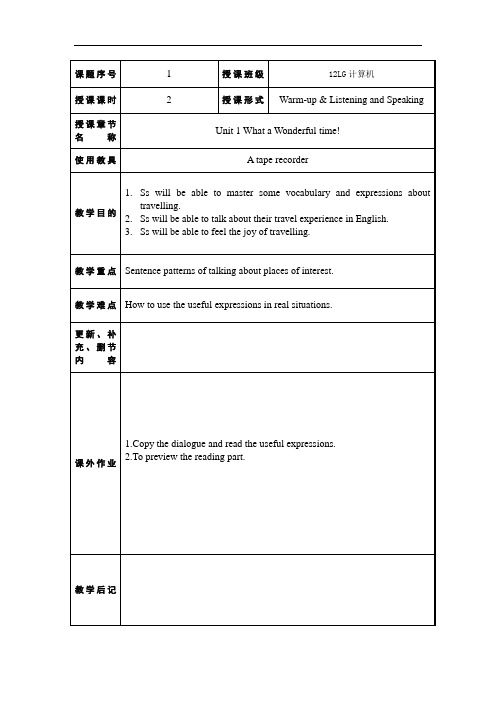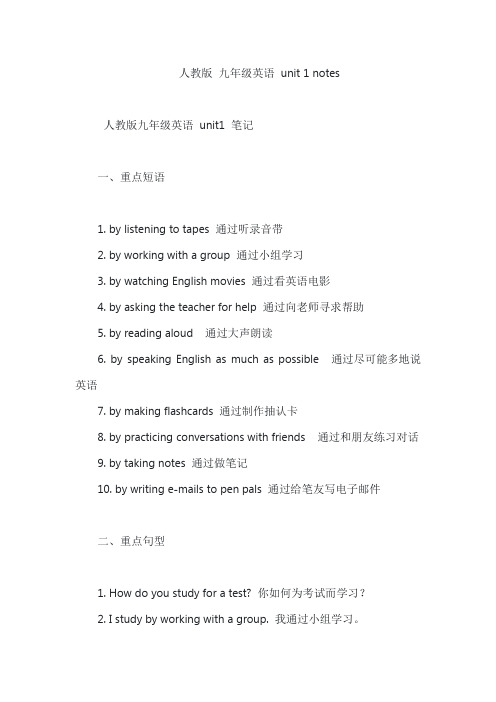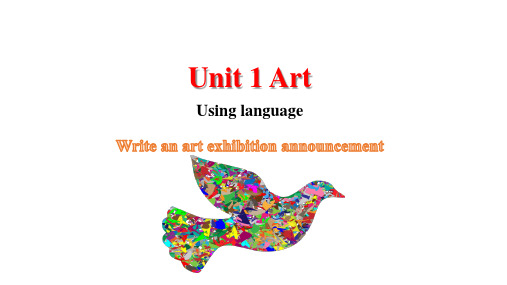unit 1 language notes
凤凰职教英语第二册Unit1

名称
Unit 1 What a Wonderful Time!
使用教具
A tapeRecorder
教学目的
1.Sswillhave a good understanding of the reading material
2.Sscandevelop readingand writingstrategies.
1.hear of意为“听说,耳闻”
hear from意为“收到某人的来信”
2.a bit意为“稍微,有点儿”,用作副词,表示程度
a bit of意为“一点”,表示数量,后接名词
3.be famous for因…而出名
be famous as作为…而闻名
课堂教学安排
教学过程
主要教学内容及步骤
Step 1
3.Ss will be able to understand the meaning of travelling.
教学重点
Understanding of thestructure of thepassage
教学难点
How towrite a short passage about traveling
a bit意为“稍微,有点儿”,用作副词,表示程度;a bit of“一点”,表示数量,后接名词。
e.g. She seemed a bit angry with me.
Ialways cook potatoes with a bit of onion.
not a bit一点也不not a little很,非常
Check the answer
Pic 1: snow mountain
Pic 2: beach
人教版 九年级英语 unit 1 notes

人教版九年级英语unit 1 notes人教版九年级英语unit1 笔记一、重点短语1. by listening to tapes 通过听录音带2. by working with a group 通过小组学习3. by watching English movies 通过看英语电影4. by asking the teacher for help 通过向老师寻求帮助5. by reading aloud 通过大声朗读6. by speaking English as much as possible 通过尽可能多地说英语7. by making flashcards 通过制作抽认卡8. by practicing conversations with friends 通过和朋友练习对话9. by taking notes 通过做笔记10. by writing e-mails to pen pals 通过给笔友写电子邮件二、重点句型1. How do you study for a test? 你如何为考试而学习?2. I study by working with a group. 我通过小组学习。
3. It’s too hard to understand the voices. 声音太难听懂了。
4. What about reading aloud to practice pronunciation? 大声朗读来练习发音怎么样?5. I have a lot of trouble memorizing new words. 我在记新单词方面有很多困难。
6. I find it easy to learn English. 我发现学习英语很容易。
三、词语辨析1. too...to... 太……而不能……,表否定so...that... 如此……以至于……,表肯定例:He is too young to go to school. 他太小了以至于不能去上学。
Unit+1+Using+language+课件-高中英语外研版(2019)选择性必修第一册精选全文

(非限制性定语从句)
Charles Smith去年退休了,他曾经是我的老师。
They rely on themselves, which is much better.
先行词是句子
(非限制性定语从句)
他们依靠自己,这样好得多。
Grammar: Non-defining attributive clauses
maintain a healthy mind to make you feel happier.
even during times of
• Try to accept your mistakes. You can
difficulty.
learne your eyes and picture the future.
Read the passage and rewrite the tips using non-defining
attributive clauses. Add more tips to the list if you can.
• Go for a walk in the countryside. There SECRETS TO HAPPINESS you can enjoy the beautiful views and a
新外研社高中英语选择性必修一 Unit1 Laugh out loud Using Language
Grammar
Grammar: Non-defining attributive clauses Look at the sentences from the reading passage and answer the questions.
Achieving a positive state of peaceful atmosphere.
英语外研版(2019)选择性必修一课件 Unit 1 Using language—istening

Task 2: Match the expressions you have completed in Task 1 to their meanings.
_la_u_g_h_i_n_g_s_t_o_c_k_: a person that everyone laughs at because they have done something funny or silly _b_e_a_l_l _s_m_i_le_s_: to look friendly and happy, especially when other people are not expecting you to
Using language—Listening
Unit 1 Laugh out loud!
1. Accumulate some new words and phrases through listening to some daily conversations; 2.Learn to express laughter in English.
Karen: But I don’t get it...How on earth did people actually believe that there
was such a thing as “Smellovision”?
Mark: The professor did a demonstration. He placed coffee beans and onions inside the Smellovision and asked people watching the programme at home to phone him if they could smell anything. And people did! Some really believed they could smell the coffee beans and onions. Some even said that the onions made their eyes water!
七年级上册第一单元英语笔记

七年级上册第一单元英语笔记Unit 1: English Notes for Grade 7 (First Semester)Hello everyone! Today, I will be sharing my English notes from the first unit of the seventh-grade syllabus. In this unit, we have covered various topics that are essential for building a strong foundation in the English language. Let's dive into the key points and concepts we've learned!1. Greetings and IntroductionsWe began the unit by learning the basic greetings and introductions. This includes phrases such as "Hello," "Hi," "How are you?" and "Nice to meet you." It is important to use these phrases appropriately in different situations to make a good impression.2. Personal InformationNext, we focused on learning how to express personal information. We learned to introduce ourselves by providing our names, ages, nationalities, and other details. It is crucial to practice these conversations regularly to gain confidence in speaking English fluently.3. Classroom LanguageIn this section, we learned common classroom language to enhance our communication within the school environment. Phrases like "May I go to the restroom?" or "Can you repeat that, please?" were covered. It is essential to understand and use these expressions effectively to communicate with teachers and classmates.4. Numbers and Countable NounsWe dedicated a considerable amount of time to learning numbers and countable nouns. This involved understanding how to spell and pronounce numbers, along with basic mathematical operations. Additionally, we practiced using countable nouns in sentences, such as "I have three pens."5. Plurals and Indefinite ArticlesThis section introduced us to plurals and indefinite articles. We learned how to make nouns plural by adding "-s" or "-es" at the end. Moreover, we explored the usage of indefinite articles like "a" and "an" before singular nouns. These concepts are vital for constructing grammatically correct sentences.6. Subject Pronouns and Possessive AdjectivesUnderstanding subject pronouns and possessive adjectives is crucial when engaging in conversations. We covered pronouns such as "I," "you," "he," "she," "it," "we," and "they" in various conversational contexts. Possessive adjectives, such as "my," "your," "his," "her," "its," "our," and "their," were also discussed.7. Family and RelationshipsLearning to talk about family members and relationships allows us to have meaningful conversations. We studied vocabulary related to family members, including "mother," "father," "brother," "sister," and so on. We also explored conversational phrases such as "Who is this?" or "How many siblings do you have?"8. Daily RoutinesDescribing our daily routines helps us understand the concept of time and develop our language skills further. We practiced using appropriate verbs and adverbs to explain our daily activities, such as "I wake up at 7o'clock," "I brush my teeth," or "I go to school by bus."9. Hobbies and Leisure ActivitiesTo make conversations more engaging, we learned how to discuss our hobbies and leisure activities. This included vocabulary related to various hobbies, such as "reading," "playing sports," "drawing," and "listening to music." Sharing our interests and discussing them in English helps to expand our vocabulary and improve our speaking skills.10. Describing People and ThingsIn this section, we learned how to describe people's physical appearance and objects in detail. We practiced using adjectives effectively to express characteristics such as height, weight, and color. For example, we learned to say, "She has long brown hair," or "The car is red and fast."In conclusion, these are the key points and concepts covered in the first unit of the seventh-grade English syllabus. By familiarizing ourselves with basic greetings, personal information, classroom language, numbers, plurals, pronouns, and more, we have taken an important step towards building a solid foundation in English. Practicing these concepts regularly will undoubtedly lead to significant improvements in our language skills. Let's continue to explore, learn, and grow in the world of English!。
初中英语冀教版八年级上册Unit1《Lesson1 Back to School》优质课教案比赛获奖教案公开课教师面试试讲教案

初中英语冀教版八年级上册Unit1《Lesson1 Back to School》优质课教案省级比赛获奖教案公开课教师面试试讲教案【名师授课教案】1教学目标1.进行课堂听说读写训练,提高学生英语听说读写能力。
2. 将课文主题与生活紧密联系,培养学生在生活中学习英语、运用英语的能力。
2学情分析通话学习,学生具备一定的交流及会话能力3重点难点4教学过程4.1第一学时教学活动1【导入】Back to schoolStep 1: Warm-up1. GreetingT: Good morning, girls and boys.2. Lead-inHow do you like the first day of a new school year?Do you have any new subjects? Do you think you will like them?Key Words: new subjectsStep 2: Listening and taking notes1. Listen to the dialogue.2. Listen again and tick the correct pictures.3. Listen to the teacher carefully and take notes when meet important points. Step 3: SpeakingT: Work in pairs. Role-play Li Ming and Danny, talk about your new term.Step 4: Sample Items and Tasks ListFour erasers (2 points)Three rulers (2 points)。
新世纪英语视听说unit1_new_friends_new_faces1

An English Video Course 1 视听说教程(3rd Edition)电子教案 1
Unit 1 New Friends, New Faces
Unit
1
New Friends, New Faces
Lesson A Meeting new people Lesson B What does he look like?
_____________: silviaC@.br Message: Hi everyone! I want to make friends with people from all over the world. E-mail me and tell me about you and your country!
Unit
1
New Friends, New Faces
Lesson A Meeting new people Lesson B What does he look like?
An English Video Course 1 视听说教程(3rd Edition)电子教案 1
Listening Activity 1 Hi, I’m Fiona. A Listen to three people from the pen pals website. Match the name of the speaker with his or her interest.
2
4
Unit
1
New Friends, New Faces
Lesson A Meeting new people Lesson B What does he look like?
An English Video Course 1 视听说教程(3rd Edition)电子教案 1
Unit+1+Using+language+for+writing人教版(2019)选择性必修第三册

civil service, so he turned to painting instead. In time, he gained
recognition as one of the greatest artists China has ever known. This
painting, showing high mountains, trees, and houses covered in snow, was made with现e在x分tra词o短rd语in作ar定y语skill. Though it is over 500 years old, it looks as
同位语
崇拜者 admirer n.-admire v.崇拜,钦佩
同样十分重要的(看点)是一组近百件商代青铜器藏品。虽然创
作这些伟大作品的艺术家并不为人所知,但他们在创造这些精美作
品时展现了高超的技巧。部分展品被认为来自乾隆皇帝(1711-1799)
的收藏,乾隆皇帝是商代青铜器的崇拜者。
Finally, we have many fine examples of Tang Dynasty (618-907) sculptures. Most of these are of Buddhist origin. Even though Buddhism
some of which are thought 6 to have come (come) from the collection of Emperor
Qianlong,7 a
great admirer of Shang Dynasty bronze. Many fine examples of Tang
(the museum is closed on Mondays). No one will be admitted into the
- 1、下载文档前请自行甄别文档内容的完整性,平台不提供额外的编辑、内容补充、找答案等附加服务。
- 2、"仅部分预览"的文档,不可在线预览部分如存在完整性等问题,可反馈申请退款(可完整预览的文档不适用该条件!)。
- 3、如文档侵犯您的权益,请联系客服反馈,我们会尽快为您处理(人工客服工作时间:9:00-18:30)。
9. set down
写下, 记下 I have the details set down here in my notes. 我已将详细内容记到了笔记本上。
set forth 阐明,称述 The reason for my decision are set forth. 做出这项决定的理由我已在报告里 说明了。
直到那时,他才意识到自己错了。
Not until then did he realized _____________________________________. that he was wrong.
2. while walking the dog, you were careless and it got loose and was hit by a car.
5.calm down Let’s go and calm your angry brother downБайду номын сангаас Though it was dangerous, he remained calm.
6. be concerned about / for 对…关心,担心 be concerned with 与 … 有关 ,参与 as/so far as sb. is concerned =in one’s opinion 就某人而言, 在某人 看来
1 Your friend comes to school very upset. 2 His friend’s death upset him very much. 3 I will be really upset if you don’t come.
upset
vt &vi upset upset upsetting 使…不安,使心烦,扰乱
如果有必要,请及时与我联系。
_____________________________________. Please get in touch with me in time, if necessary.
3. It / This is the first / second …time that +主语+have / has done. It / This was the first / second / third … time that + 主语+ had done. 意为“某人第几次做某事”
The meeting was concerned ____ with reforms and everyone present was concerned _____ for their own interests.
1 我们都担心着她的安全.
concerned about / for her safety. We are all ______________________________________.
10. face to face 面对面地 (在句中作状语) face-to-face adj.面对面的 (作定语) 类似的还有heart to heart 坦诚地 shoulder to shoulder 肩并肩地 back to back 背对背地 She stood __________ (面对面地) with him. face to face We had ________________ (面对面的交谈). a face-to-face talk That night they talked heart to heart ____________ (坦诚地) with each other.
get sb. doing sth. 让某人一直做某事
get sb. to do sth.
让某人做某事
have sb. doing sth. 让某人一直做某事
have sb. do sth. 让某人做某事
3. upset 1. adj.
2. V.
Are you upset when the new term begins? Does the new school term upset you ?
①add…to…给…加上 ②add to增加,添加 ③add up合计,加起来 ④add up to总计达,总共有
(1)Will you add more sugar _____________? to the coffee (2)His whole school education___________ added up to only one year. (3)His illness _________the family’s trouble. added to (4)We have planted flowers and green trees around the buildings, which___ the beauty of the city. A.add to. B. add up. C. add up to. D. are added to
While (you are) walking the dog,you …… When heated, water will be changed into vapor 过马路时要小心。 Be careful while/when crossing the ____________________________________. street.
walk sb. / sth. 遛(动物),陪(人)步 get loose 松了 行 end-of-term exam 期末考试
• 1 be good to sb. • 2 make the following survey • 3 see a film with a friend • 4 help sb.(to)do sth. • 5 get sth. repaired • 6 be upset • 7 ignore sb./ sth. • 8 calm sb. down • 9 have got to • 10 be concerned about
adj.心烦意乱的,不舒服的,不适的,难过的.
4. ignore ignorant ignorance
vt. adj.不知道的,无知的 n.无知,愚昧
He ignores the doctor’s advice and goes on smoking. I was ignorant that the boss could be so strict. The villagers’ ignorance made them poorer and poorer.
set in 开始(并将延续下去) The rainy season has set in. 雨季已经开始了。 set up 创建, 建立 The government has set up a committee
to inquire into the problem.
政府成立了一个委员会调查这个问题。
强调结构(it is / was ... that / who)
句型:
1. Your friend can’t go until he finishes cleaning the bicycle. 火车未停,请别下车。
Don’t get off the train until ____________________________________.
the train has stopped.
b. 宾语从句中的it is ... that ... 为强调句式, 其基本结构是:It is / was + 被强调部 分(常是主语、宾语或状语) + that / who(强调主语且主语指人时可以用 who,也可以用that) + 其它部分。
强调句式只是把句子中的某些成分
(被强调的部分)改变位置,所以把
样的错误).
4. I wonder if it’s because I haven’t been able to be outdoors for so long that I’ve grown so crazy about everything to do with nature. [分析] a. 本句的结构是:主语(I) + 谓语 (wonder)+宾语从句(if ...nature)。
• • • • • • •
11 go on holiday 12 take care of 13 walk the dog 14 be careless 15 get loose 16 be hit by a car 17 take the dog to the vet • 18 take the end-of-term exam • 19 cheat in the exam • 20 should have studied hard.
I’m not familiar with the town. It is the first time that I ______________. have come here He told me it was the fourth time that he ________________________ (犯同 had made the same mistake
表示过去应该做某事而实际上没有做
You should have come her five minutes ago.
You shouldn’t have told him about this.
8 cheat n. V.作弊,作假 cheat sb. (out) of sth. 骗取某人的某物 Cheating in examination can get you into trouble. A stranger cheated the old woman (out) of her money.
